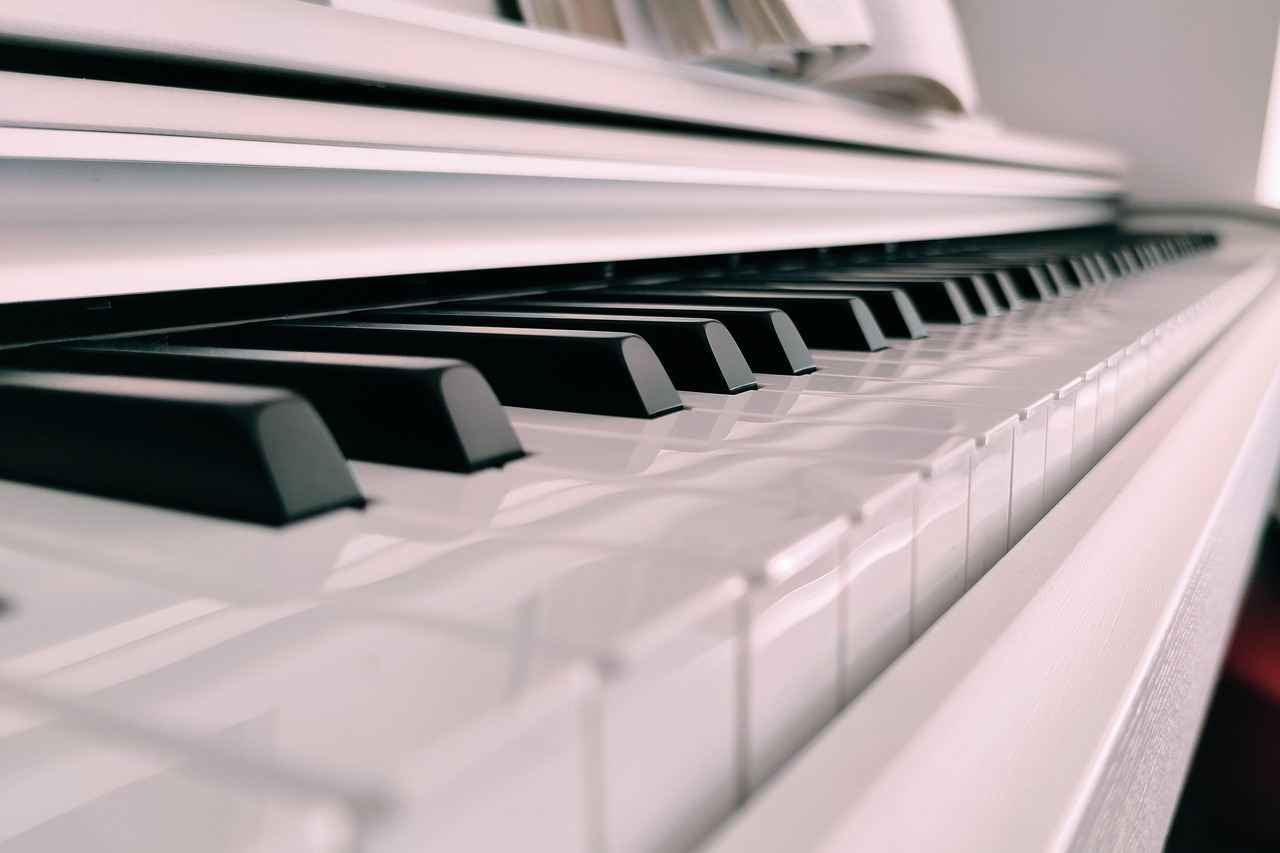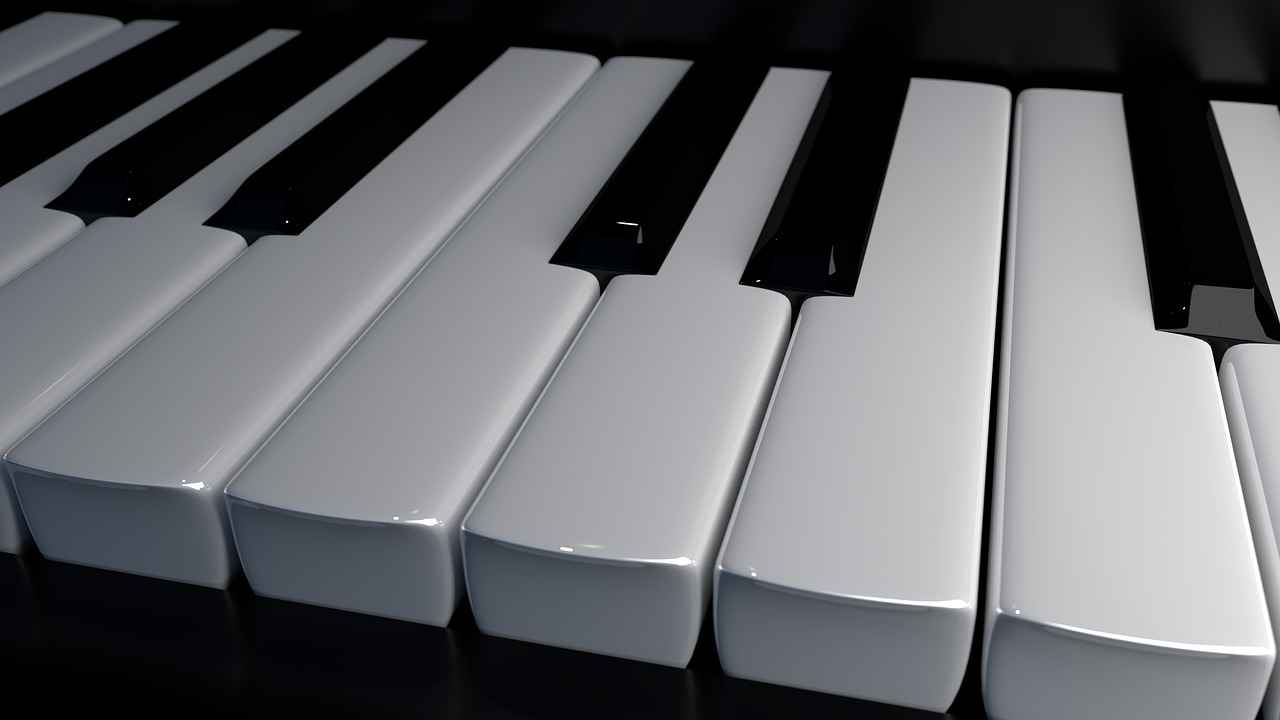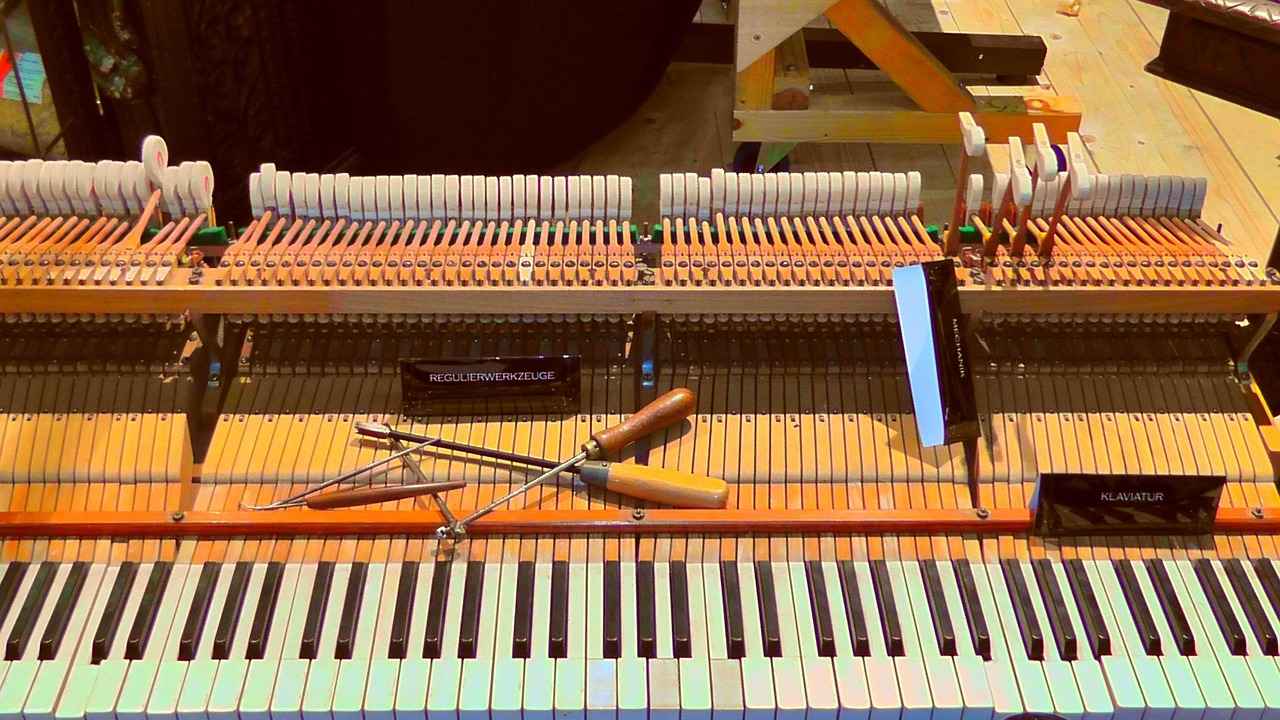Finding the right piano instructor can be a transformative experience in your musical journey. Whether you are a beginner eager to learn the basics or an experienced player looking to refine your skills, the choice of an instructor can significantly impact your growth and enjoyment of the instrument. In this article, we will delve into key factors to consider when selecting a piano teacher in your area, ensuring you find the perfect fit for your unique musical aspirations.
What Should I Look for in a Piano Instructor?
When searching for a piano instructor, several factors should be taken into account. Start by evaluating their qualifications. Look for teachers with formal training in music, as this can indicate a solid understanding of music theory and performance techniques. Additionally, consider their teaching style. Some instructors may adopt a traditional approach, focusing on classical techniques, while others might incorporate contemporary methods and technology into their lessons. A good fit for your learning style can enhance your progress and enjoyment.
How Important Are Qualifications and Experience?
Qualifications and experience are crucial when choosing a piano instructor. A teacher with a degree in music education or performance typically has a thorough understanding of the subject matter, which can be beneficial for students. Moreover, experience matters; seasoned instructors often develop effective teaching strategies that cater to various learning styles. It’s wise to ask potential teachers about their background, including any certifications from recognized music organizations, as these can reflect their commitment to ongoing education and professional development.
What Teaching Styles Should I Consider?
Teaching styles can vary significantly among piano instructors. Some may focus on classical repertoire, while others might emphasize popular music or improvisation. It’s essential to identify what resonates with you. For instance, if you prefer a structured environment, a traditional teacher may suit you better. Conversely, if you enjoy creativity and exploration, a modern instructor who incorporates diverse musical genres might be a better match. Personalized lessons tailored to your interests can make learning more engaging and enjoyable.
How Can I Assess an Instructor’s Compatibility with My Goals?
To ensure your chosen instructor aligns with your musical goals, consider conducting interviews or trial lessons. Prepare a list of questions that cover their teaching philosophy, lesson structure, and how they tailor their approach to individual students. For example, ask how they handle different skill levels and what methods they use to motivate students. This dialogue can provide insights into whether their teaching style aligns with your learning preferences and aspirations.
What Are the Benefits of Taking Local Piano Lessons?
Local piano lessons come with unique advantages. One significant benefit is convenience; having a teacher nearby can make it easier to commit to regular lessons. Additionally, local instructors often have ties to community resources, such as music schools or performance opportunities, which can enrich your learning experience. Engaging with a local community can also foster connections with fellow musicians and provide additional support in your musical endeavors.
What Should I Expect from My First Lesson?
Understanding what to expect during your first lesson can help alleviate any anxiety. Typically, instructors will assess your skill level and discuss your goals. They might introduce you to basic concepts and techniques, setting the groundwork for future lessons. To maximize your first session, come prepared with any necessary materials, such as a notebook or a beginner’s piano book, which can facilitate a productive experience.
How Can I Evaluate Progress with My Piano Instructor?
Monitoring your progress is vital for growth. Set clear milestones and communicate regularly with your instructor about your development. Discussing your achievements and areas for improvement can help keep you motivated and focused on your goals. Regular feedback from your instructor can also provide valuable insights into your playing and guide your practice sessions effectively.
What Are the Costs Associated with Piano Lessons?
Understanding the financial commitment of piano lessons is essential for planning. Prices can vary significantly based on location, instructor experience, and lesson length. When budgeting, consider not only the hourly rate but also any additional costs, such as materials or performance fees. This comprehensive approach will help you make informed decisions about your musical education.
How Can I Find Piano Lessons Near Me?
Finding local piano lessons is more accessible than you might think. Utilize online resources like music directories or local community boards to discover instructors in your area. Additionally, don’t underestimate the power of word-of-mouth recommendations from friends or family who may have had positive experiences with local teachers. These personal insights can lead you to great instructors and help you make informed choices.
In conclusion, selecting the right piano instructor involves careful consideration of qualifications, teaching styles, and personal compatibility. By following the guidelines outlined in this article, you can embark on a rewarding musical journey that aligns with your goals and aspirations. Whether you are just starting or looking to enhance your skills, the right teacher can make all the difference in your piano learning experience.

What Should I Look for in a Piano Instructor?
Finding the right piano instructor is a significant step in your musical journey. Whether you’re a beginner or looking to refine your skills, the instructor you choose can greatly influence your learning experience. In this article, we will delve into the essential factors to consider when selecting a piano teacher, ensuring you find someone who meets your specific needs and goals.
When it comes to selecting a piano instructor, there are several key elements to evaluate. These include qualifications, teaching style, and experience. Each of these factors plays a crucial role in determining the effectiveness of your lessons and your overall satisfaction.
- Qualifications: A qualified instructor typically holds a degree in music or education, which can provide a solid foundation in music theory and performance. Look for teachers who have attended reputable institutions or have certifications from recognized music organizations.
- Experience: An instructor’s experience can significantly impact their teaching quality. A seasoned teacher is likely to have developed effective methods for communicating concepts and addressing common challenges faced by students.
- Teaching Style: Each instructor has a unique approach to teaching. Some may favor traditional methods focusing on classical repertoire, while others may incorporate modern techniques or technology. Understanding their style can help you determine if it aligns with your learning preferences.
To assess these factors effectively, consider the following steps:
- Research: Look up potential instructors online. Read reviews and testimonials from past students to gauge their reputation.
- Interview: Schedule a meeting or a trial lesson. This is a great opportunity to ask questions about their teaching philosophy, approach to lesson planning, and how they tailor their instruction to individual needs.
- Observe: During the trial lesson, pay attention to how the instructor interacts with you. Are they encouraging? Do they provide constructive feedback? This interaction can be a good indicator of how well you might work together.
Additionally, it’s important to consider your own goals. Are you looking to play classical music, pop songs, or perhaps compose your own pieces? Communicating your aspirations to a potential instructor can help them tailor their approach to suit your objectives.
In conclusion, selecting the right piano instructor involves careful consideration of their qualifications, experience, and teaching style. By conducting thorough research, engaging in meaningful discussions, and reflecting on your own learning preferences, you can find an instructor who will guide you effectively on your musical journey. Remember, the right fit can make all the difference in your progress and enjoyment of playing the piano.

How Important Are Qualifications and Experience?
When embarking on your piano learning journey, one of the most critical decisions you will make is selecting the right instructor. Understanding the qualifications and experience of a piano instructor can significantly impact your learning and overall musical growth. In this section, we will explore why these factors matter and what to look for when evaluating potential instructors.
The qualifications of a piano instructor often serve as a benchmark for their expertise. Many reputable instructors hold degrees in music education or performance from accredited institutions. These degrees typically encompass a comprehensive understanding of music theory, performance techniques, and pedagogy. Having a formal education in music can indicate that the instructor is well-versed in the foundational principles of music, which is essential for teaching effectively.
Moreover, instructors who have pursued additional certifications from recognized music organizations often demonstrate a commitment to their craft. Certifications can signify that the instructor has engaged in ongoing education and professional development, keeping them updated with the latest teaching methodologies and trends in music education.
While qualifications are vital, the experience of a piano instructor can play an equally crucial role in the quality of education you receive. An experienced instructor has likely encountered a diverse range of students and learning styles, allowing them to adapt their teaching methods to meet individual needs. This adaptability can significantly enhance your learning experience, as they can provide personalized guidance that resonates with your unique goals and challenges.
Furthermore, seasoned instructors often possess a wealth of practical knowledge and performance experience. They can share insights from their own musical journeys, helping to inspire and motivate students. A teacher who has performed in various settings can offer valuable tips on stage presence, repertoire selection, and overcoming performance anxiety, which are essential skills for any aspiring musician.
- Educational Background: Look for instructors with degrees in music or related fields.
- Teaching Experience: Consider how long they have been teaching and the variety of students they have worked with.
- Specializations: Some instructors may specialize in specific genres or teaching methods. Ensure their expertise aligns with your interests.
- Reviews and Testimonials: Seek feedback from former students to gauge the instructor’s effectiveness and teaching style.
In conclusion, the qualifications and experience of a piano instructor can significantly influence your learning journey. By taking the time to evaluate these factors, you can make an informed decision that aligns with your musical aspirations. A well-qualified and experienced instructor can not only teach you the technical aspects of playing the piano but also inspire you to explore your musical creativity and expression.
What Degrees or Certifications Should a Piano Teacher Have?
When embarking on your piano learning journey, one of the most crucial decisions you’ll make is selecting the right instructor. A pivotal aspect of this choice is understanding the qualifications and certifications that a piano teacher should possess. In this section, we will delve into the educational backgrounds that can enhance a teacher’s ability to guide students effectively.
Many piano instructors boast degrees in music education or performance, which often serve as a strong foundation for their teaching capabilities. Understanding the significance of these qualifications can help you gauge a teacher’s expertise and suitability for your learning needs.
- Music Education Degrees: These degrees typically encompass comprehensive studies in music theory, history, and pedagogy. Teachers with this background are trained to convey complex concepts in an accessible manner, making them adept at teaching students of all ages.
- Performance Degrees: Instructors with performance degrees often possess advanced skills in playing the piano and may have experience performing in various settings. This practical expertise can inspire students and provide them with insights into the nuances of musical interpretation.
- Certifications: Beyond degrees, many teachers pursue certifications from recognized music organizations, such as the Music Teachers National Association (MTNA). These credentials often reflect a teacher’s commitment to ongoing education and professional development, ensuring they stay current with teaching methodologies and trends.
In addition to formal education, the experience of a piano teacher plays a significant role in their effectiveness. A teacher’s ability to adapt their teaching style to suit individual student needs often stems from years of hands-on experience. For instance, a seasoned instructor may have encountered a variety of learning styles and challenges, allowing them to develop tailored approaches that resonate with each student.
Moreover, a teacher’s educational background can also influence their teaching philosophy. For example, instructors with a strong foundation in music theory may emphasize the importance of understanding musical structures, while those with a performance background might focus on expressive playing and artistry. This diversity in teaching approaches can significantly impact your learning experience.
When evaluating potential piano teachers, consider asking about their educational background and any certifications they hold. This inquiry not only shows your interest in their qualifications but also allows you to assess how well their expertise aligns with your learning goals. It’s essential to find an instructor who not only has the necessary credentials but also resonates with your musical aspirations.
Ultimately, the right qualifications can enhance your piano learning experience, providing you with the tools and guidance needed to progress effectively. Whether you are a beginner or an advanced student, understanding what degrees or certifications a piano teacher should have will empower you to make an informed decision.
Why Is a Music Degree Beneficial?
When considering a piano instructor, one key factor that often arises is their educational background, particularly whether they hold a music degree. This aspect can significantly influence the quality of instruction you receive. But why exactly is a music degree beneficial for a piano teacher? Let’s delve into the various reasons that underscore the importance of formal music education.
A music degree typically encompasses a comprehensive curriculum that covers essential areas such as music theory, performance, and pedagogy. Understanding these components is crucial for effective teaching.
- Music Theory: This subject forms the backbone of musical understanding. A teacher well-versed in theory can explain the principles behind the music, helping students grasp complex concepts like harmony, melody, and rhythm.
- Performance Skills: A degree often requires students to perform regularly, which not only hones their skills but also equips them with the experience to guide students through performance anxiety and stage presence.
- Pedagogy: This area focuses on the art and science of teaching. A music degree includes training in how to effectively communicate musical concepts and adapt teaching methods to meet diverse learning styles.
Instructors with a music degree are often better prepared to create structured, engaging lesson plans that cater to their students’ needs. They possess a deeper understanding of the learning process and can implement various teaching strategies to foster a positive learning environment. This is especially important for beginners who may struggle with foundational skills.
Moreover, having a music degree often means the instructor has undergone rigorous training and has a solid grasp of music history, which allows them to provide context and background to the pieces being studied. This enriches the learning experience and helps students appreciate the music on a deeper level.
Teachers with a music degree are usually committed to their craft, often engaging in professional development through workshops, seminars, and conferences. This commitment to continuous learning ensures they stay updated with the latest teaching techniques and trends in music education.
Additionally, instructors who prioritize education often inspire their students to adopt a similar mindset. A teacher’s enthusiasm for learning can be contagious, motivating students to pursue their musical education with vigor and passion.
Finally, a music degree can serve as a mark of credibility. When searching for a piano instructor, knowing they have formal training can provide peace of mind. It indicates that they have been vetted through an academic program and have demonstrated a level of proficiency in their field.
In conclusion, while a music degree is not the only factor to consider when choosing a piano instructor, it certainly carries significant weight. The foundational knowledge, enhanced teaching effectiveness, commitment to continuous learning, and credibility that come with a music degree can greatly enrich your piano learning experience.
Are Certifications Worth Considering?
When searching for the perfect piano instructor, one question often arises: Are certifications from recognized music organizations truly valuable? The answer is a resounding yes! These certifications not only enhance the credibility of the teacher but also serve as a testament to their dedication and ongoing education in the field of music. In this article, we will explore the significance of certifications, how they reflect a teacher’s commitment, and what they mean for students seeking quality instruction.
What Do Music Certifications Represent?
Music certifications are awarded by esteemed organizations that evaluate a teacher’s skills, knowledge, and teaching methodologies. They often cover various aspects of music education, including theory, performance, and pedagogy. For instance, certifications from organizations like the Music Teachers National Association (MTNA) or the Royal Conservatory of Music indicate that the instructor has met specific standards and has undergone rigorous assessments to prove their expertise.
Why Are Certifications Important for Teachers?
- Commitment to Professional Development: A certified instructor demonstrates a commitment to their craft by engaging in ongoing education. This continuous learning process allows them to stay updated with the latest teaching techniques, trends, and methodologies.
- Enhanced Teaching Skills: Certifications often require instructors to complete workshops, courses, or examinations. This process equips them with advanced teaching strategies, enabling them to cater to a diverse range of students effectively.
- Trust and Credibility: Certifications instill confidence in students and parents. Knowing that a teacher has achieved recognition from a reputable organization can significantly influence your decision when selecting an instructor.
What Benefits Do Students Gain from Certified Instructors?
Choosing a certified piano teacher can have a profound impact on a student’s learning experience. Here are some key benefits:
- Structured Learning: Certified instructors often have a well-defined curriculum that adheres to established educational standards. This structured approach can help students progress more effectively.
- Access to Resources: Many certified teachers have access to exclusive teaching materials, workshops, and events, which can enhance the learning experience for their students.
- Networking Opportunities: Certified instructors are often part of professional networks and communities, providing students with opportunities for collaboration, performances, and competitions.
Are All Certifications Created Equal?
While certifications can be beneficial, it’s essential to consider their relevance and the reputation of the issuing organization. Not all certifications carry the same weight, so doing your research is crucial. Look for instructors who hold certifications from well-respected organizations in the music education field.
In conclusion, certifications from recognized music organizations are indeed worth considering when selecting a piano instructor. They reflect a teacher’s commitment to their craft and ongoing education, enhancing both their teaching skills and the learning experience for students. By choosing a certified instructor, you not only gain access to quality education but also align yourself with a professional who is dedicated to fostering your musical journey.
How Can Experience Influence Teaching Quality?
Experience plays a crucial role in shaping a teacher’s ability to connect with students. This connection is vital for fostering a positive learning environment and enhancing the overall educational experience. In the realm of piano instruction, a teacher’s experience can significantly influence not only their teaching quality but also the student’s engagement and progress. Let’s delve deeper into how experience can enhance your learning journey.
A seasoned piano instructor brings a wealth of knowledge and practical skills to the table. Their years of teaching can lead to a refined approach that adapts to the diverse needs of students. Experienced teachers often have a repertoire of strategies to address common challenges faced by beginners and advanced students alike. For instance, they can identify when a student struggles with a particular technique and quickly adjust their teaching methods to provide alternative explanations or exercises.
Experienced teachers tend to have a better understanding of how to motivate students. They know that each student has unique learning styles and preferences. By drawing on their experience, they can create a more engaging and personalized learning experience. For example, an experienced instructor might incorporate a student’s favorite songs into lessons to spark interest and enthusiasm. This not only makes practice enjoyable but also helps students develop a deeper connection to music.
Effective communication is essential in teaching, and experienced instructors often excel in this area. They have honed their ability to convey complex concepts in a clear and relatable manner. This skill is particularly important in music education, where technical jargon can sometimes be overwhelming. An experienced teacher can break down intricate ideas into digestible parts, ensuring that students grasp the material without feeling lost.
- Adaptability: Experienced instructors can adjust their teaching styles based on the student’s progress and feedback.
- Resourcefulness: They often have a collection of materials, exercises, and methods that they can draw upon to enhance lessons.
- Inspiring Confidence: A teacher with a solid track record can instill confidence in students, encouraging them to take risks and explore their musical abilities.
- Networking Opportunities: Veteran instructors often have connections within the music community, providing students with opportunities for performances, collaborations, and further learning.
Over time, a teacher’s philosophy on education evolves based on their experiences in the classroom. An experienced piano instructor may adopt a more holistic approach to teaching, focusing not just on technical skills but also on the emotional and creative aspects of music. This comprehensive perspective can significantly enrich a student’s learning experience, encouraging them to express themselves and connect with music on a deeper level.
In conclusion, the influence of experience on teaching quality cannot be overstated. An experienced piano instructor brings invaluable insights, adaptability, and a wealth of resources to the learning process. By understanding the profound impact of experience, students can make informed decisions when selecting their piano instructor, ensuring a fulfilling and enriching musical journey.

What Teaching Styles Should I Consider?
When embarking on your piano learning journey, one of the most crucial factors to consider is the teaching style of your instructor. This aspect can greatly influence your overall experience and progress. Different instructors have unique methods of teaching, and identifying which style resonates with you can significantly enhance your learning process. In this section, we will explore various teaching styles, their characteristics, and how to determine the best fit for your musical aspirations.
Teaching styles can vary widely among piano instructors, and understanding these differences can help you make an informed choice. Here are some common teaching styles you might encounter:
- Traditional Method: This style often emphasizes classical techniques, focusing on reading sheet music and mastering fundamental skills. Instructors using this method may prioritize music theory and structured lessons.
- Modern Approach: In contrast, modern teaching styles may incorporate technology, popular music, and improvisation. These instructors often encourage creativity and self-expression, allowing students to explore a broader range of musical genres.
- Student-Centered Learning: In this approach, the instructor tailors lessons to fit the individual needs and preferences of the student. This style often involves setting personal goals and adapting teaching methods to suit the student’s learning pace.
- Collaborative Learning: Some instructors promote group lessons or collaborative projects, allowing students to learn from one another. This style can foster a sense of community and make learning more enjoyable.
To determine which teaching style resonates with you, consider the following factors:
- Your Learning Preferences: Reflect on how you learn best. Do you thrive in structured environments, or do you prefer a more flexible and creative approach?
- Your Musical Goals: Think about what you want to achieve. Are you keen on mastering classical pieces, or are you more interested in playing contemporary music?
- Trial Lessons: Many instructors offer trial lessons, which can provide insight into their teaching style. Use this opportunity to assess how comfortable you feel and whether their approach aligns with your expectations.
Ultimately, the right teaching style can make a substantial difference in your piano learning experience. A compatible instructor will not only enhance your skills but also inspire you to enjoy the process of learning music. Remember, it’s essential to communicate your preferences and goals with your instructor, as this can help them tailor their teaching methods to better suit your needs.
In conclusion, finding an instructor whose teaching style aligns with your learning preferences is vital for a fulfilling piano journey. By understanding the various teaching styles available and reflecting on your own needs, you can make a more informed decision that will positively impact your musical growth.
How Do Traditional vs. Modern Teaching Methods Differ?
When it comes to learning the piano, the choice between traditional and modern teaching methods can significantly influence your musical journey. Each approach offers unique advantages and challenges, and understanding their differences can help you make an informed decision about your piano education.
Traditional piano teaching methods are often characterized by a focus on classical techniques and structured learning. These methods typically emphasize:
- Classical Repertoire: Students often start with well-known classical pieces, which helps build a strong foundation in music theory and technique.
- Sheet Music Reading: A significant portion of traditional teaching revolves around reading sheet music, which is essential for understanding musical notation.
- Technical Exercises: Instructors often assign scales, arpeggios, and other technical exercises to develop finger strength and dexterity.
These methods have been time-tested and can instill discipline and a deep appreciation for classical music. However, some students may find this approach rigid and less engaging, especially if they have a preference for contemporary music styles.
Modern teaching methods, on the other hand, often incorporate technology and contemporary music into the learning process. Key features of modern approaches include:
- Incorporation of Technology: Many instructors use apps and online resources to enhance learning, providing interactive exercises and instant feedback.
- Focus on Contemporary Music: Students may have the opportunity to learn popular songs, jazz, or improvisation, aligning more closely with their musical interests.
- Personalized Learning: Modern methods often emphasize tailoring lessons to fit the individual student’s goals, making the learning experience more relevant and enjoyable.
This approach can foster a love for music and creativity, as students are encouraged to explore various genres and styles. However, some critics argue that this flexibility may lead to gaps in foundational skills if not balanced with traditional techniques.
The impact of traditional versus modern teaching methods can vary widely among students. For those who thrive in structured environments, traditional methods might provide the discipline they need to succeed. Conversely, students who enjoy a more relaxed and creative atmosphere may find modern methods more appealing.
Ultimately, the best approach depends on the individual learner’s goals, interests, and learning style. A blended approach that incorporates elements of both traditional and modern methods could offer a well-rounded musical education.
Understanding the distinctions between traditional and modern teaching methods is crucial for anyone looking to learn piano. By evaluating your personal preferences and musical aspirations, you can choose a method that resonates with you, ensuring a fulfilling and enjoyable learning experience.
What Is the Importance of Tailored Lessons?
When it comes to learning the piano, one size does not fit all. Personalized lessons are essential for catering to individual learning styles and goals, transforming your piano journey into a more enjoyable and effective experience. Tailored lessons take into account your unique strengths, weaknesses, and preferences, leading to a more engaging and productive learning process.
Every student has a distinct approach to learning, influenced by factors such as age, previous musical experience, and personal interests. Tailored lessons address these differences head-on, ensuring that your educational experience is aligned with your specific needs. Here are some key reasons why personalized piano lessons are vital:
- Individualized Attention: With personalized lessons, instructors can focus on your specific challenges and goals. This means that if you struggle with a particular technique or piece, your teacher can dedicate more time to that area, helping you overcome obstacles more efficiently.
- Learning Style Adaptation: Everyone has a preferred learning style—some may be visual learners, while others might learn best through auditory or kinesthetic methods. A tailored approach allows instructors to adapt their teaching methods to resonate with your personal style, making the learning process smoother and more intuitive.
- Goal Alignment: Whether you aim to play classical masterpieces, contemporary pop songs, or even compose your own music, personalized lessons can help you set and achieve your musical goals. Your instructor can guide you through repertoire that excites you, enhancing motivation and commitment.
- Fostering Creativity: Tailored lessons encourage creativity by allowing you to explore music that interests you. This could mean incorporating improvisation or composition into your lessons, which can lead to a deeper understanding of music theory and a more fulfilling learning experience.
- Flexible Pacing: Everyone learns at their own pace, and personalized lessons allow you to progress at a speed that feels comfortable for you. If you grasp concepts quickly, your instructor can introduce more challenging material sooner, while those who need more time can take the necessary steps to fully understand each lesson.
Incorporating these elements into your piano education not only enhances your technical skills but also builds your confidence as a musician. For instance, if you’re a beginner struggling with finger placement, a tailored lesson can focus specifically on exercises that improve dexterity and hand coordination. This focused attention can make all the difference in your progress.
Ultimately, the importance of tailored lessons lies in their ability to create a personalized learning environment that fosters growth, creativity, and enjoyment. By aligning the lessons with your unique needs and aspirations, you can embark on a piano journey that is not only effective but also deeply satisfying.

How Can I Assess an Instructor’s Compatibility with My Goals?
When embarking on your musical journey, particularly with piano lessons, it is essential to find an instructor who resonates with your aspirations and learning style. Compatibility with your instructor can significantly influence your motivation, progress, and overall enjoyment of the learning process. Here are some effective strategies to assess whether a potential instructor aligns with your musical goals.
Compatibility with a piano instructor goes beyond just their qualifications or teaching style. Here are several factors to consider:
- Musical Goals: Clearly define your musical aspirations. Are you interested in classical music, jazz, or contemporary styles? Make sure your instructor has experience in the genre you want to explore.
- Teaching Approach: Different instructors have varying methods. Some might focus on technique, while others emphasize creativity and expression. Understanding their approach can help you gauge if it aligns with your preferences.
- Communication Style: An instructor’s ability to communicate effectively is vital. Do they explain concepts clearly? Are they supportive and encouraging? A good rapport can enhance your learning experience.
- Flexibility: Life can be unpredictable. An instructor who is flexible with scheduling and lesson content can make your learning experience more enjoyable and less stressful.
Engaging in a conversation with potential instructors can provide valuable insights into their teaching philosophy and compatibility. Here are some essential questions to consider:
1. What is your teaching philosophy?2. How do you tailor lessons to meet individual student needs?3. Can you share your experience with students who have similar goals as mine?4. What materials and resources do you use in your lessons?5. How do you measure student progress and success?
These questions can help you assess whether the instructor’s approach aligns with your learning style and goals.
Understanding an instructor’s teaching philosophy is crucial. Some instructors prioritize structured lessons with a focus on technique, while others may encourage improvisation and creativity. To gauge their philosophy:
- Observe Their Passion: A passionate instructor will likely inspire you to engage more deeply with your music.
- Ask About Student-Centered Learning: Inquire how they adapt their teaching to meet the needs of different students. This can indicate their commitment to fostering a supportive learning environment.
- Check for Reviews or Testimonials: Feedback from former students can provide insight into the instructor’s effectiveness and teaching style.
Ultimately, finding the right piano instructor is about more than just technical skill; it’s about establishing a connection that fosters growth and creativity. By carefully evaluating compatibility through thoughtful questioning and self-reflection, you can ensure a more fulfilling and productive musical journey.
What Questions Should I Ask During an Interview?
When searching for the right piano instructor, it’s essential to ask the right questions during your interview. This process can help you determine if their teaching style, philosophy, and experience align with your musical goals. Below, we outline several key questions that can guide your conversation and provide valuable insights into the instructor’s approach.
Understanding an instructor’s teaching philosophy is crucial. This question helps you gauge their approach to music education. Do they prioritize classical techniques, or do they incorporate modern methods? Knowing their philosophy can reveal how they structure lessons and what they value most in the learning process.
Every student has unique learning styles and goals. Asking how an instructor tailors their lessons can provide insight into their adaptability and willingness to cater to your specific needs. Do they assess your skill level and interests before designing a curriculum? This question can help you determine if the instructor is committed to your personal growth.
Inquire about the materials the instructor uses for lessons. Do they provide sheet music, exercises, or digital resources? Understanding the resources available can give you an idea of the learning tools that will be at your disposal, enhancing your overall experience.
Experience matters when it comes to teaching. Ask the instructor about their background with students who have similar skill levels to yours. Have they successfully guided beginners or advanced players? This can help you assess their ability to connect with you and facilitate your learning.
Every instructor has different benchmarks for progress. Understanding their expectations can help you set realistic goals. What milestones do they believe are essential for a student to achieve? This will allow you to align your efforts with their teaching style and ensure you are on the same page.
Feedback is vital for improvement. Ask the instructor how they communicate feedback to students. Do they provide written assessments, verbal critiques, or both? Knowing how feedback is delivered can help you understand how to approach corrections and improvements in your playing.
Scheduling is an important aspect of your learning journey. Inquire about the instructor’s availability and flexibility. Are they open to rescheduling if conflicts arise? This can help you determine if the instructor’s schedule aligns with yours, ensuring a smoother learning experience.
By asking these questions during your interview with potential instructors, you can gain a clearer picture of their teaching methods and how they align with your musical aspirations. The right questions can lead to insightful conversations that will help you make an informed decision, ultimately enhancing your piano learning experience.
How Can I Gauge Their Teaching Philosophy?
When embarking on your musical journey, it’s essential to understand how a piano instructor’s teaching philosophy aligns with your learning style. Gauging a teacher’s philosophy can provide insights into their approach to education, which can significantly influence your experience and growth as a musician.
A teaching philosophy is essentially a set of beliefs and values that guide an educator’s approach to teaching. It encompasses their views on how students learn best, the role of the teacher, and the importance of the subject matter. Understanding this philosophy can help you determine if an instructor is the right fit for you.
The philosophy of a music teacher can shape the entire learning environment. For instance, some instructors may prioritize classical techniques and traditional methods, while others might embrace a more modern approach that incorporates technology and contemporary music styles. If you thrive in an environment that fosters creativity and exploration, a teacher with a flexible teaching philosophy may be more suitable for you.
- Ask Direct Questions: During your initial meeting or interview, inquire about their teaching methods and what they believe is essential for student success. Questions like, “How do you approach lesson planning?” or “What role do you think practice plays in a student’s development?” can elicit valuable insights.
- Observe Their Teaching Style: If possible, attend a trial lesson or observe a class. Pay attention to how the instructor interacts with students, the types of feedback they provide, and how they address different learning styles.
- Review Student Testimonials: Feedback from current or former students can offer a glimpse into the instructor’s teaching philosophy. Look for comments about their approach to learning and how they adapt to individual needs.
| Philosophy | Description |
|---|---|
| Traditional | Focuses on classical techniques, music theory, and structured lesson plans. |
| Progressive | Emphasizes creativity, improvisation, and student-led learning. |
| Holistic | Takes into account the emotional and social aspects of learning music. |
Ultimately, understanding a teacher’s philosophy on music education is a crucial step in finding the right instructor for your learning style. By engaging in open dialogue and observing their methods, you can ensure that your musical journey is not only productive but also enjoyable. Remember, the right match can make all the difference in your growth as a pianist.

What Are the Benefits of Taking Local Piano Lessons?
When considering piano lessons, one of the most important decisions you’ll make is whether to take lessons locally or online. While both options have their merits, local piano lessons come with a unique set of advantages that can significantly enhance your learning experience. In this article, we will delve into the numerous benefits of taking piano lessons in your community, highlighting aspects that contribute to a more enriching musical journey.
Local piano lessons offer a multitude of advantages that extend beyond just convenience. Here are some key benefits:
- Convenience and Accessibility: One of the most significant advantages of local lessons is the ease of access. Living close to your instructor means that you can easily fit lessons into your schedule without the hassle of long commutes. This proximity encourages consistency, making it more likely that you’ll attend lessons regularly, which is crucial for progress.
- Community Engagement: Taking lessons locally allows you to connect with your community. You may find opportunities to participate in local music events, recitals, or group classes, which can enhance your learning experience. Engaging with fellow musicians can provide a sense of belonging and motivation as you share your musical journey.
- Personalized Attention: Local instructors often have smaller student bases compared to larger online platforms. This means they can offer more personalized attention and tailor lessons to your specific needs and goals. A teacher who knows you personally can adapt their teaching style to suit your learning pace, making lessons more effective.
- Immediate Feedback: In-person lessons allow for real-time feedback, which can be invaluable in mastering the piano. Your instructor can immediately correct your technique, provide tips, and help you overcome challenges as they arise. This immediate interaction can significantly accelerate your learning process.
- Networking Opportunities: Learning locally can open doors to networking with other musicians and instructors in your area. You may find opportunities for collaboration, performance, or even mentorship that you wouldn’t have access to otherwise. Building a network in your local music scene can lead to enriching experiences and growth.
Additionally, local lessons can foster a sense of accountability. Knowing that you have a scheduled lesson can motivate you to practice regularly, as you want to make the most out of your time with your instructor. This accountability can be particularly beneficial for beginners who may struggle with self-motivation.
Moreover, local instructors often have a better understanding of the community’s musical culture and preferences. They can guide you in selecting music that resonates with local audiences and encourage you to participate in community events, such as open mic nights or local competitions, helping you gain confidence and experience.
In summary, local piano lessons provide a host of benefits that can enhance your learning experience. From convenience and personalized attention to community engagement and immediate feedback, these advantages can make a significant difference in your musical journey. As you embark on your path to becoming a skilled pianist, consider the value of finding a local instructor who can support and guide you every step of the way.
How Does Proximity Affect Commitment?
When it comes to learning a musical instrument like the piano, commitment plays a crucial role in achieving success. One significant factor that can influence your dedication to lessons is the proximity to your instructor. Living close to your piano teacher can create a more favorable environment for consistent practice and attendance. Let’s delve deeper into how this geographical closeness can enhance your commitment to learning.
Living near your piano instructor brings about several advantages that can lead to increased commitment to your lessons. First and foremost, it reduces the barriers to attendance. When your instructor is just a short drive or walk away, the chances of skipping a lesson due to travel fatigue or time constraints are significantly diminished. This convenience makes it easier to integrate piano lessons into your weekly routine.
Moreover, proximity fosters a sense of community and belonging. When you take lessons from a local instructor, you’re not just learning to play the piano; you’re also becoming part of a musical network. This connection can motivate you to attend lessons regularly, as you may find yourself engaging with fellow students or participating in local music events. The social aspect of learning can enhance your overall experience, making it more enjoyable and rewarding.
Additionally, being close to your instructor allows for more flexibility in scheduling lessons. If something comes up and you need to reschedule, it’s much easier to find a suitable time when your instructor is nearby. This flexibility can lead to fewer missed lessons and a more consistent learning experience. It also enables you to take advantage of impromptu practice sessions or additional lessons if you feel the need for extra guidance.
Another important factor is the increased accountability that comes from having a nearby instructor. Knowing that your teacher is just around the corner can motivate you to practice more diligently. You may feel a sense of responsibility to show up prepared for each lesson, which can enhance your learning and progress. This accountability can be particularly beneficial for beginners who may struggle with self-discipline in their practice routines.
Lastly, having a local instructor can open doors to community resources such as workshops, recitals, or group classes. These opportunities can enrich your learning experience and provide additional motivation. When you see other students progressing and participating in community events, it can inspire you to stay committed and engaged in your piano journey.
In summary, living close to your piano instructor can significantly enhance your commitment to lessons. The convenience, sense of community, flexibility in scheduling, accountability, and access to local resources all contribute to a more enriching learning experience. By choosing a local instructor, you are not just investing in piano lessons; you are investing in a supportive environment that fosters your musical growth.
Are There Community Resources Available?
When it comes to learning an instrument like the piano, the environment and resources available to you can significantly enhance your experience. Local music schools and community centers often serve as valuable hubs for aspiring musicians, offering a range of resources and opportunities for collaboration. In this section, we will explore how these community resources can enrich your piano learning journey.
Many people might not realize the wealth of resources available right in their local communities. Community centers and music schools often provide various programs designed to support musicians of all skill levels. These resources can include:
- Group Classes: Many local centers offer group piano classes, which can be a fun and engaging way to learn. These classes not only provide instruction but also foster a sense of community among students.
- Workshops: Workshops featuring guest instructors or specialized topics can help deepen your understanding of piano techniques, music theory, or even composition.
- Recitals and Performances: Participating in community recitals allows students to showcase their skills and gain performance experience. This can be incredibly beneficial for building confidence.
- Collaborative Opportunities: Local music schools often encourage collaboration between students. This can lead to forming bands, duets, or even participating in larger ensembles, which can greatly enhance your learning experience.
- Access to Instruments: Some community centers provide access to pianos and other instruments, making it easier for students to practice without the need for a personal instrument.
Moreover, community resources often promote networking opportunities with other musicians. Building relationships with fellow students and instructors can lead to collaborative projects, mentorships, and even lifelong friendships. For instance, if you attend a local music school, you might meet other aspiring pianists who share your passion. You could form a study group to practice together or even collaborate on a piece for a recital.
Additionally, community centers often host events where local musicians perform. Attending these performances can be inspiring and provide insights into various playing styles and techniques. It also gives students the chance to see what is possible with dedication and practice.
In summary, leveraging local music schools and community resources can significantly enhance your piano learning experience. By participating in group classes, workshops, and collaborative opportunities, you not only improve your skills but also become part of a vibrant musical community. Whether you are a beginner or an advanced player, these resources can provide the support and inspiration needed to thrive in your musical journey.

What Should I Expect from My First Lesson?
Embarking on your piano journey can be both exciting and nerve-wracking. Understanding what to expect during your first lesson can significantly ease your nerves and set a positive tone for your musical adventure. Here’s a detailed overview of common practices and what you can anticipate on that important day.
Your first piano lesson is a crucial step in your musical journey. It’s not just about hitting the keys; it’s about laying the foundation for your learning experience. Here’s what you can typically expect:
- Introduction and Icebreakers: Most instructors will start with a friendly introduction, allowing you to get to know each other. This is a great time to share your musical interests and goals. Don’t hesitate to express what you hope to achieve!
- Assessment of Skill Level: Your instructor will likely assess your current skill level. If you’re a complete beginner, they might ask you to identify notes or play simple melodies. If you have some experience, be prepared to showcase what you can do. This assessment helps the teacher tailor lessons to your needs.
- Setting Goals: After the assessment, your instructor will discuss your musical aspirations. Whether you want to learn classical pieces, pop songs, or even jazz improvisation, sharing your goals will help your teacher create a personalized learning plan.
- Introduction to Basic Concepts: Expect to learn some fundamental concepts during your first lesson. This might include an introduction to musical notation, basic scales, and perhaps even a simple piece to start practicing. Your instructor will likely emphasize the importance of these basics as they are the building blocks of your piano education.
- Materials and Resources: Your instructor may provide you with a list of recommended materials, such as method books or online resources, to aid your practice. It’s essential to have the right tools to support your learning.
- Discussion of Practice Routines: Finally, your instructor will probably discuss practice routines. Consistent practice is key to improvement, so they might suggest how much time you should dedicate to practice each week and what exercises to focus on.
As you prepare for your first lesson, consider bringing the following materials:
| Item | Purpose |
|---|---|
| Piano or Keyboard | Essential for practice and lessons |
| Notebook | For taking notes and tracking progress |
| Pencil | To mark important notes in your materials |
| Music Stand | To hold your sheet music comfortably |
In summary, your first piano lesson is an opportunity to establish a solid foundation for your musical journey. By understanding what to expect, you can approach your lesson with confidence and enthusiasm. Remember, every pianist was once a beginner, and this is just the beginning of an exciting adventure in music!
How Do Instructors Typically Structure Initial Lessons?
When embarking on your piano learning journey, the first lesson can be both exciting and nerve-wracking. Understanding how instructors typically structure these initial sessions can help you approach your first lesson with confidence and a clear mindset. Instructors often aim to create a comfortable environment where you can express your musical aspirations while they assess your current skill level.
Typically, the first lesson begins with a brief introduction. This is where you and your instructor get to know each other. Expect to discuss your musical background, interests, and goals. This conversation is crucial as it helps the instructor tailor the lessons to your specific needs. For instance, if you are interested in playing classical music, your instructor might focus on different techniques than if you want to play pop songs.
After the introductions, the instructor will likely assess your current skill level. This could involve:
- Playing a Simple Piece: You may be asked to play a short piece or a few scales. This helps the instructor gauge your finger dexterity, rhythm, and familiarity with the piano.
- Discussing Music Theory: They might ask you questions about basic music theory concepts, such as note names, scales, and chords. This will help them understand your theoretical knowledge.
- Setting Goals: Based on the assessment, the instructor will discuss your goals. Whether you want to play for fun, perform, or take exams, setting clear objectives will guide your learning path.
Once your skill level is assessed, the instructor will likely outline a personalized learning plan. This plan may include:
- Lesson Focus: Specific areas of focus such as technique, sight-reading, or improvisation.
- Materials: Recommended books or online resources that align with your goals.
- Practice Schedule: A suggested practice routine to help you stay on track between lessons.
To make the most of your first lesson, it’s essential to come prepared. Here’s a quick checklist of items you might want to bring:
- Piano or Keyboard: If you own one, having it available for practice is beneficial.
- Notebook: For jotting down notes, goals, and assignments from your instructor.
- Music Books: Any music books you currently use or are interested in.
In summary, the first piano lesson is a foundational step in your musical journey. By understanding how instructors typically structure these lessons, you can approach your first session with a positive mindset and a clear direction. Remember, the goal is not only to assess your skills but also to inspire and motivate you to pursue your musical aspirations.
What Materials Should I Bring to My First Lesson?
Starting your piano journey can be both exciting and nerve-wracking, especially when it comes to your first lesson. One of the best ways to ensure a smooth start is to be well-prepared. Bringing the right materials can set the tone for your learning experience and help you get the most out of that initial session. But what exactly should you bring? Let’s delve into the essentials.
When preparing for your first piano lesson, it’s important to gather a variety of materials that will facilitate your learning. Here are some key items you should consider bringing:
- Piano or Keyboard: If you have a portable keyboard, bring it along. This will allow you to practice during the lesson and follow along with your instructor.
- Sheet Music: If you have any specific pieces you want to learn, bring the sheet music. This helps your instructor understand your interests and tailor lessons accordingly.
- Notebook and Pen: Keeping a notebook handy is crucial. Jot down notes, tips, and exercises your instructor shares. This will be a valuable resource for your practice sessions.
- Metronome: If you have one, bringing a metronome can be beneficial. It helps you develop a sense of timing and rhythm, which is essential for any musician.
- Water Bottle: Staying hydrated is important, especially if you’re feeling nervous. A quick sip can help you refocus and stay comfortable during your lesson.
Additionally, consider bringing a list of questions you might have. This can range from inquiries about practice techniques to specific goals you wish to achieve. Your instructor will appreciate your eagerness to engage and will likely provide valuable insights that cater to your interests.
Moreover, it’s helpful to wear comfortable clothing that allows you to move freely. This can help you relax and focus on the lessons without distractions. If you have any previous music experience, even if it’s minimal, share that with your instructor. They can use this information to better assess your starting point and develop a personalized plan for your learning journey.
Lastly, remember that being prepared doesn’t just mean bringing physical materials. Approach your first lesson with an open mind and a positive attitude. Being ready to learn and engage will make a significant difference in your experience.
In summary, bringing the right materials to your first piano lesson can greatly enhance your learning experience. From your instrument to a notebook for taking notes, these items will help you make the most of your time with your instructor. Embrace the journey ahead with enthusiasm and curiosity.

How Can I Evaluate Progress with My Piano Instructor?
Monitoring your progress is essential for growth in any endeavor, especially in learning an instrument like the piano. Evaluating your development effectively helps you stay motivated and focused on your musical journey. Here are some strategies to consider.
Setting clear milestones is crucial for tracking your progress. These milestones can vary based on your skill level and personal goals. Here are some common milestones to aim for:
- Beginner Level: Learning basic scales and simple songs within the first few months.
- Intermediate Level: Mastering more complex pieces and understanding basic music theory.
- Advanced Level: Performing pieces from different genres and possibly composing your own music.
Regularly reviewing these milestones with your instructor can provide a clear roadmap for your learning. It allows both you and your instructor to assess where you are and what areas need more focus.
Maintaining an open line of communication with your piano instructor is vital. Regular check-ins can enhance your learning experience significantly. Here’s how you can structure your communication:
- Weekly Lessons: Discuss your progress and any challenges you’re facing during each lesson.
- Mid-Session Reviews: Schedule a review every few weeks to evaluate your progress against your milestones.
- Feedback Sessions: Ask for constructive feedback on specific pieces you are working on.
Effective communication not only helps you understand your development but also fosters a supportive learning environment. Your instructor can provide tailored advice and adjust lessons based on your feedback.
Utilizing various tools can streamline the process of monitoring your progress. Consider the following:
- Practice Journals: Keep a journal to record your daily practice sessions, noting what you worked on and any challenges encountered.
- Recording Yourself: Record your practice sessions to listen back and identify areas for improvement.
- Apps and Software: Use music learning apps that provide feedback on your playing and track your progress over time.
These tools can provide valuable insights into your learning process, allowing you to celebrate successes and identify areas that require additional effort.
Recognizing your achievements, no matter how small, is vital for maintaining motivation. Here are some ways to celebrate:
- Perform for Friends and Family: Sharing your progress with loved ones can boost your confidence.
- Set Personal Rewards: Treat yourself when you reach a significant milestone, such as completing a challenging piece.
- Reflect on Growth: Take time to look back at your earlier recordings or pieces to see how far you’ve come.
Celebrating your achievements not only reinforces your commitment but also makes the learning process more enjoyable.
In conclusion, evaluating your progress with your piano instructor is a multi-faceted approach that involves setting milestones, maintaining communication, utilizing tracking tools, and celebrating achievements. By actively engaging in this process, you can foster a deeper connection with your musical journey and ensure continuous growth.
What Milestones Should I Aim for?
Setting clear milestones in your piano learning journey is essential for tracking your progress and maintaining motivation. Whether you are a beginner or an advanced player, having specific goals can provide direction and a sense of achievement as you advance in your skills. In this section, we will explore what milestones you should aim for, how to set them effectively, and the importance of celebrating your achievements along the way.
Milestones can be categorized into short-term and long-term goals. Short-term milestones help you stay focused on immediate tasks, while long-term milestones provide a broader perspective on your overall progress. Here are some key milestones to consider:
- Learning Basic Techniques: In the initial stages, focus on mastering fundamental skills such as hand positioning, finger strength, and basic scales. These foundational techniques are crucial for your development.
- Playing Simple Songs: Aim to learn and play simple pieces within the first few months. Choose songs that you enjoy, as this will keep you motivated and engaged.
- Understanding Music Theory: As you progress, begin to familiarize yourself with basic music theory concepts. Understanding how music works will enhance your playing and make learning new pieces easier.
- Achieving Consistency: Set a milestone for practicing consistently. For example, aim to practice for at least 30 minutes a day, five days a week. Consistency is key to improvement.
- Preparing for a Recital: If your instructor offers recitals, aim to participate in one. This will give you a goal to work towards and help build your confidence in performing.
- Exploring Different Genres: Once you are comfortable with the basics, challenge yourself to explore various musical styles. This can broaden your skills and keep your practice sessions exciting.
- Setting Personal Records: Track your progress by setting personal records, such as the number of pieces learned in a month or the speed at which you can play a scale. This will give you tangible evidence of your growth.
It’s important to remember that milestones should be realistic and tailored to your individual skills and aspirations. Regularly reassess your goals and adjust them as needed to ensure they remain challenging yet achievable. Furthermore, celebrating your milestones, no matter how small, can significantly enhance your motivation. Whether it’s treating yourself to a favorite snack after mastering a piece or sharing your progress with friends and family, acknowledging your achievements is crucial for maintaining enthusiasm on your musical journey.
In conclusion, setting clear milestones is a powerful strategy for tracking your progress and staying motivated throughout your piano journey. By defining both short-term and long-term goals, you can create a structured path that leads to continuous improvement and fulfillment in your musical endeavors.
How Often Should I Communicate with My Instructor?
When embarking on your piano learning journey, one of the most crucial aspects to consider is how often you should communicate with your instructor. Regular communication can significantly enhance your learning experience, providing you with the support and feedback necessary to progress effectively. In this section, we will explore the key factors that determine the frequency of check-ins with your instructor and how to make the most of these interactions.
Establishing a routine of regular communication with your piano instructor is essential for several reasons. First and foremost, it fosters a strong teacher-student relationship, creating an open line of dialogue where you can express your concerns, ask questions, and share your progress. This relationship is vital for a productive learning environment.
Moreover, regular check-ins allow your instructor to assess your development continuously. They can provide you with tailored feedback, helping you identify areas that need improvement and celebrating your achievements. This feedback loop is crucial for maintaining motivation and ensuring that you stay on the right track.
The frequency of communication can vary based on your individual learning style and goals. However, here are some general guidelines to consider:
- Weekly Lessons: If you are taking weekly lessons, it’s beneficial to communicate with your instructor at least once a week. This could be during your lesson or through a quick email or message summarizing your progress and any challenges you faced during practice.
- Bi-Weekly or Monthly Lessons: If your lessons are less frequent, consider checking in more often. A brief email or message after each practice session can help keep your instructor informed about your progress and any difficulties you encounter.
- Before Recitals or Exams: Increased communication is essential as you approach performance opportunities. Discussing your repertoire and any performance anxiety can help you prepare mentally and technically.
During your communications, focus on the following key areas:
- Progress Updates: Share what you’ve been practicing, the pieces you’re working on, and any breakthroughs or setbacks you’ve experienced.
- Feedback Requests: Don’t hesitate to ask for specific feedback on areas where you feel stuck or uncertain. This can guide your practice sessions more effectively.
- Goal Setting: Discuss your short-term and long-term goals with your instructor. This will help them tailor lessons to meet your aspirations.
In conclusion, maintaining regular communication with your piano instructor is vital for your growth as a musician. It ensures that you receive the necessary support and guidance tailored to your unique learning journey. By establishing a routine of check-ins, you can maximize your learning experience and foster a productive relationship with your instructor. Remember, the more you communicate, the more you will benefit from your lessons!

What Are the Costs Associated with Piano Lessons?
Understanding the financial commitment of piano lessons is crucial for planning. When you decide to embark on your musical journey, it’s essential to have a clear picture of the costs involved. This investment goes beyond just the hourly rate of lessons; it encompasses various aspects that can impact your overall budget. Let’s break down what you can expect to invest in piano lessons and how to prepare financially.
Piano lessons can vary significantly in price depending on several factors, including location, instructor experience, lesson length, and whether the lessons are private or group sessions. Here’s a closer look at these elements:
- Location: The cost of living in your area plays a significant role in lesson pricing. For instance, urban areas with higher living costs typically have more expensive lessons compared to rural regions. In cities, you might find rates ranging from $50 to $100 per hour, while in smaller towns, prices can drop to $30 to $60 per hour.
- Instructor Experience: An instructor’s qualifications and experience can also influence pricing. Teachers with advanced degrees or extensive performance backgrounds may charge higher fees due to their expertise. Expect to pay a premium for instructors who have a proven track record of successful students.
- Lesson Length: Most piano lessons are offered in 30, 45, or 60-minute increments. Longer lessons often provide more comprehensive instruction but come at a higher cost. For example, a 30-minute lesson might cost $25 to $40, while a full hour could range from $50 to $100.
- Group vs. Private Lessons: Group lessons are generally more affordable than private sessions. If you’re looking to save money, consider joining a group class, which can cost around $15 to $30 per session. However, private lessons offer personalized attention and tailored instruction, which can be worth the extra investment.
When planning your budget for piano lessons, it’s essential to consider additional costs that may arise:
- Materials: You may need to purchase sheet music, method books, or other learning resources, which can add up. Budgeting $20 to $50 for materials each month is a reasonable estimate.
- Instrument Costs: If you don’t already own a piano or keyboard, this can be a significant expense. Digital pianos can range from $300 to $1,000, while acoustic pianos can cost several thousand dollars.
- Recitals and Competitions: Participation in recitals or competitions may involve fees for registration, venue rental, or even travel. These costs can vary widely, so it’s wise to set aside funds for these opportunities.
In summary, understanding the costs associated with piano lessons is vital for effective financial planning. By considering factors such as location, instructor experience, lesson length, and additional expenses, you can create a realistic budget that aligns with your musical goals. Remember, investing in quality instruction can lead to significant long-term benefits in your musical journey.
How Do Lesson Prices Vary by Location?
When considering piano lessons, one of the most significant factors to take into account is the price, which can fluctuate based on your geographical location. The cost of piano lessons is influenced by a variety of factors, including local demand, the cost of living, and the availability of qualified instructors. In this section, we will delve into how these regional differences can significantly impact the pricing of piano lessons.
In metropolitan areas, piano lessons tend to be more expensive due to a higher cost of living and greater demand for music education. For instance, cities like New York or Los Angeles often see rates ranging from $50 to $100 per hour. This premium pricing can be attributed to the concentration of professional musicians and educators, as well as the increased competition among instructors, which raises the overall market rate.
On the other hand, in smaller towns or rural areas, the prices can be significantly lower. In these regions, you might find lessons priced between $25 and $40 per hour. The lower cost of living and less competition can make it easier for instructors to offer affordable rates. However, it’s essential to consider the availability of qualified teachers in these areas, as fewer options may limit your choices.
Another crucial factor is the type of lessons being offered. For example, group lessons may be a more economical option, typically ranging from $15 to $30 per session, depending on the location. This can be a great way to learn while also saving money. However, individual lessons provide personalized attention and may justify a higher price point.
Additionally, consider the qualifications and experience of the instructor. A teacher with a prestigious background or extensive performance experience may charge more for their lessons, regardless of location. In contrast, newer instructors might offer lower rates as they build their clientele. It’s essential to weigh the cost against the potential benefits of learning from a highly qualified teacher.
Finally, keep in mind that prices can also fluctuate based on the time of year. For instance, many instructors may increase their rates during peak seasons, such as the start of the school year or just before holiday events when demand for lessons is higher. Being aware of these trends can help you plan your budget more effectively.
In summary, the cost of piano lessons varies significantly based on location, instructor qualifications, lesson types, and seasonal demand. Understanding these factors can help you make informed decisions when selecting a piano instructor that fits both your budget and educational needs.
What Should I Consider When Budgeting for Lessons?
Budgeting for piano lessons is an essential aspect of your musical journey that goes beyond merely considering the hourly rate of the instructor. While the cost per lesson is a significant factor, there are several additional expenses and considerations that you should keep in mind to ensure that you are fully prepared for your commitment.
When planning your budget for piano lessons, it’s important to take a comprehensive approach. Here are some key factors to consider:
- Hourly Rate: The first step is to determine the hourly rate of potential instructors in your area. Rates can vary widely based on factors such as location, instructor experience, and lesson format.
- Frequency of Lessons: Consider how often you plan to take lessons. Weekly lessons are common, but some students may benefit from bi-weekly sessions. Factor in the total number of lessons you plan to take each month.
- Materials and Resources: In addition to lesson costs, you may need to invest in materials such as sheet music, books, or online resources. These can add up, so budgeting for them is crucial.
- Instrument Maintenance: If you own a piano, remember that maintenance costs (like tuning and repairs) can be an ongoing expense. If you’re renting an instrument, factor in those costs as well.
- Recitals and Performances: Participating in recitals or performances can enhance your learning experience, but they may also come with additional fees for venue rentals, registration, or even dress costs.
- Travel Expenses: If your instructor is not local, consider travel costs. This might include gas, public transport fares, or even long-distance lessons conducted via video calls.
- Additional Fees: Some instructors may charge extra for materials or specific types of lessons, such as group sessions or specialized workshops. Always clarify these details upfront.
To illustrate, let’s create a simple budget breakdown for a hypothetical student:
| Item | Estimated Cost |
|---|---|
| Hourly Rate (4 lessons/month) | $200 |
| Materials (books, sheet music) | $30 |
| Instrument Maintenance | $50 |
| Recital Fees | $40 |
| Travel Expenses | $20 |
| Total Estimated Cost | $370 |
This budget gives a clearer picture of the overall financial commitment required for piano lessons. By considering all these factors, you can avoid unexpected costs and ensure that your musical education remains enjoyable and sustainable.
Ultimately, effective budgeting for piano lessons not only prepares you financially but also enhances your commitment and enjoyment of the learning process. By understanding all the potential costs involved, you can make informed decisions that align with your musical goals.

How Can I Find Piano Lessons Near Me?
Finding local piano lessons can be easier than you think. Many aspiring pianists feel overwhelmed by the options available, but with the right strategies, you can locate the perfect instructor in your area. This article will discuss effective methods to help you find piano lessons that suit your needs, ensuring a fulfilling musical experience.
When searching for piano lessons, there are several avenues you can explore. Here are some effective strategies:
- Online Searches: Utilize search engines and social media platforms to find local instructors. Websites like Yelp and Google Maps can provide reviews and ratings, helping you gauge the quality of the instructors.
- Community Boards: Check local community centers, libraries, and schools for bulletin boards that may list piano instructors. This can be a great way to find teachers who are actively involved in your community.
- Music Schools: Look for music schools in your area. These institutions often have qualified instructors and structured programs that can cater to various skill levels.
- Social Media Groups: Join local music or community groups on platforms like Facebook. Members often share recommendations for piano teachers, and you can ask for suggestions directly.
Word-of-mouth recommendations can be incredibly valuable when searching for a piano instructor. Here are some tips on how to leverage your network:
- Ask Friends and Family: If you know anyone who has taken piano lessons, ask them about their experiences. Personal recommendations can lead you to trustworthy instructors.
- Network with Musicians: If you have friends who play instruments or are involved in music, they may have connections to piano teachers. Networking within musical circles can provide insights into the best instructors.
- Visit Local Events: Attend local music events or recitals. You might meet instructors or hear about them through discussions with attendees.
Once you have a list of potential instructors, it’s essential to evaluate them based on several criteria:
- Teaching Style: Different instructors have varied teaching methods. Some may focus on classical techniques, while others might incorporate modern styles. Understanding their approach can help you find a match for your learning preferences.
- Experience and Qualifications: Look for instructors with relevant experience and credentials. A teacher with a music degree or teaching certifications can often provide a more structured learning experience.
- Trial Lessons: Many instructors offer trial lessons. This is a great opportunity to see if their teaching style resonates with you before committing to regular lessons.
In conclusion, finding the right piano lessons near you involves a combination of online research, personal recommendations, and careful evaluation of potential instructors. By utilizing these strategies, you can embark on a rewarding musical journey that aligns with your goals and aspirations. Whether you are a beginner or looking to enhance your skills, the right teacher can significantly impact your piano learning experience.
What Online Resources Can Help Me in My Search?
Finding the right piano instructor can be a daunting task, especially with so many options available today. Fortunately, the internet has made this process much easier. By utilizing various online resources, you can streamline your search for local piano instructors. In this section, we will explore some effective websites and applications that can help you connect with qualified piano teachers in your area.
When it comes to finding a piano instructor, several online platforms can assist in your quest. Here are some of the most popular and effective resources:
- TakeLessons: This platform connects students with local music teachers, including piano instructors. You can filter your search based on location, availability, and teaching style. The site also features reviews from other students, which can help you gauge an instructor’s effectiveness.
- Thumbtack: Thumbtack is a versatile service that allows you to find professionals for various tasks, including music lessons. By entering your zip code and specific needs, you can receive quotes from local piano teachers, making it easier to compare options.
- Lessonface: This site focuses on online music lessons, but it also offers a directory of local instructors. You can filter by instrument and location, ensuring you find the right match for your needs. Lessonface also provides a platform for virtual lessons, which can be a great option if you prefer learning from home.
- Yelp: While primarily known for restaurant and service reviews, Yelp can be a valuable resource for finding local music teachers. You can read reviews and ratings from other students, which can give you insights into the teaching styles and effectiveness of various instructors.
- Facebook Groups: Many local communities have Facebook groups dedicated to music education. Joining these groups can help you connect with other musicians and find recommendations for piano instructors in your area. Additionally, you can post inquiries to get personalized suggestions.
By leveraging these online resources, you can save time and effort in your search for the perfect piano instructor. Each platform offers unique features, so it’s worth exploring multiple options to find the one that best suits your learning style and needs.
Moreover, don’t hesitate to utilize social media platforms like Instagram or Twitter to discover local musicians and instructors. Many teachers showcase their expertise through videos and live sessions, which can give you a taste of their teaching style before committing to lessons.
In conclusion, the digital age has transformed the way we find and connect with music instructors. By using the right online resources, you can make informed decisions and embark on your musical journey with confidence.
Should I Consider Word-of-Mouth Recommendations?
When it comes to finding the right piano instructor, one of the most effective strategies is to leverage word-of-mouth recommendations from friends and family. These personal endorsements can guide you toward instructors who have proven their worth in real-world settings. In this section, we’ll explore how to effectively utilize your network to find a great piano teacher.
Word-of-mouth recommendations are particularly valuable because they come from trusted sources. When someone you know and respect shares their positive experiences with a piano instructor, it adds a layer of credibility that online reviews simply can’t match. This personal connection often means that the instructor has a track record of success with students similar to you, whether they are beginners or more advanced players.
To make the most of your network, start by reaching out to friends, family, or acquaintances who have taken piano lessons. Here are some tips on how to ask for recommendations:
- Be Specific: When asking for recommendations, specify what you are looking for. For example, mention if you prefer a teacher with a classical background or one who incorporates modern music.
- Share Your Goals: Let them know your musical aspirations. Are you a beginner looking to learn the basics, or an intermediate player wanting to refine your skills? This information can help them provide more tailored recommendations.
- Inquire About Teaching Styles: Ask about the instructor’s teaching style. Some may focus on traditional methods, while others might use a more contemporary approach.
In addition to personal contacts, consider exploring local community boards, music schools, or social media groups focused on music education. Here are some places to look:
- Social Media: Platforms like Facebook or Instagram often have groups dedicated to local music education where members share recommendations.
- Community Centers: Many community centers offer music programs and can provide insights into local instructors.
- Local Music Stores: Staff members at music stores often have connections with local instructors and can suggest qualified teachers.
Once you receive recommendations, it’s essential to evaluate them carefully. Consider reaching out to the instructors for a brief chat or trial lesson. This will give you an opportunity to assess their teaching style and see if it aligns with your learning preferences. Don’t hesitate to ask the recommended individuals about their experiences, what they liked about the instructor, and how the lessons impacted their musical journey.
Word-of-mouth recommendations can be a powerful tool in your search for a piano instructor. By tapping into your network, asking the right questions, and evaluating potential teachers, you can significantly enhance your chances of finding the perfect fit for your musical journey. Remember, a great instructor can make all the difference in your learning experience, so take the time to find someone who resonates with you.
In conclusion, finding the right piano instructor involves careful consideration of qualifications, teaching styles, and personal compatibility. By following these guidelines, you can embark on a rewarding musical journey that aligns with your goals and aspirations. Whether you’re a beginner or looking to refine your skills, the right teacher can make all the difference in your piano learning experience.
Piano Lessons Near Me: How to Pick the Perfect Instructor
In this article, we’ll explore how to find the ideal piano instructor in your area, discussing key factors and tips to ensure you choose the right fit for your musical journey.
What Should I Look for in a Piano Instructor?
Choosing a piano instructor involves considering their qualifications, teaching style, and experience. Here’s how to evaluate potential instructors effectively. Start by researching their educational background. Many instructors hold degrees in music, which can indicate a strong foundation in music theory and performance. Next, consider their teaching style. Do they focus on classical techniques, or do they incorporate modern methods? Understanding this can help you choose an instructor that resonates with your learning preferences.
How Important Are Qualifications and Experience?
Understanding the qualifications and experience of a piano instructor can significantly impact your learning. A teacher with a music degree often possesses a solid grasp of music theory, performance, and pedagogy, essential for effective teaching. Additionally, certifications from recognized music organizations can reflect a teacher’s commitment to their craft. Experience can also shape a teacher’s ability to connect with students, enhancing your overall learning experience.
What Teaching Styles Should I Consider?
Different instructors have varying teaching styles. Traditional methods often focus on classical techniques, while modern approaches may incorporate technology and contemporary music. Identifying what resonates with you can make a significant difference in your learning process. Personalized lessons that cater to your unique learning style and goals can make your piano journey more enjoyable and effective.
How Can I Assess an Instructor’s Compatibility with My Goals?
Finding an instructor who aligns with your musical aspirations is crucial. Consider asking questions during your initial interview, such as their teaching philosophy and how they structure their lessons. Understanding their approach to music education can help determine if they’re the right match for your learning style.
What Are the Benefits of Taking Local Piano Lessons?
Local lessons offer unique advantages, including convenience and community engagement. Living close to your instructor can increase your commitment to lessons, making it easier to attend regularly. Additionally, local music schools or community centers often provide resources and opportunities for collaboration, enhancing your learning experience.
What Should I Expect from My First Lesson?
Understanding what to expect can ease your nerves and help you prepare for your first piano lesson. Initial lessons often focus on assessing your skill level and setting goals. Being prepared with the right materials, such as sheet music or a notebook, can help you get the most out of your first lesson.
How Can I Evaluate Progress with My Piano Instructor?
Monitoring your progress is essential for growth. Setting clear milestones can help you track your progress and stay motivated throughout your piano journey. Regular communication with your instructor about your progress can enhance your learning experience and ensure you’re on the right track.
What Are the Costs Associated with Piano Lessons?
Understanding the financial commitment of piano lessons is crucial for planning. Prices for piano lessons can vary based on your location, and it’s essential to consider additional costs, such as materials or performance opportunities, when budgeting for lessons.
How Can I Find Piano Lessons Near Me?
Finding local piano lessons can be easier than you think. Utilizing online platforms can streamline your search for local piano instructors, and recommendations from friends or family can lead you to great teachers. Don’t hesitate to leverage your network to find the right fit.
Frequently Asked Questions
- What qualifications should I look for in a piano instructor?
When searching for a piano instructor, consider their educational background, such as a degree in music education or performance. Additionally, look for certifications from recognized music organizations, as these can indicate a commitment to teaching and ongoing education.
- How can I determine if a teaching style is right for me?
It’s essential to assess whether the instructor’s teaching style aligns with your learning preferences. Traditional methods focus on classical techniques, while modern approaches may integrate technology and contemporary music. Discussing your goals with potential instructors can help you find the best fit.
- What should I expect during my first piano lesson?
Your first lesson will likely involve an assessment of your skill level and goal-setting. This is a great opportunity to communicate your musical aspirations and ask any questions you might have about the learning process.
- How can I track my progress with my piano instructor?
Setting clear milestones is crucial for tracking your progress. Regular communication with your instructor about your development will help you stay motivated and ensure that you’re on the right path to achieving your musical goals.
- What are the typical costs associated with piano lessons?
The cost of piano lessons can vary based on location and the instructor’s experience. When budgeting, consider not just the hourly rate, but also any additional costs such as materials, travel, or performance opportunities.
- How can I find local piano lessons near me?
Finding local piano lessons can be as simple as searching online or asking for recommendations from friends and family. Websites and apps dedicated to music education can also help streamline your search for instructors in your area.













